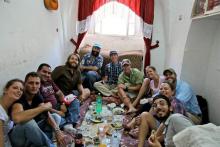Ambassador Stevens

“Sticks and stones can break my bones, but words can never hurt me.”
How many of us grew up with this old adage ringing in our ears? How many of us believe it’s true?
I’ve gone back and forth over the years. I understand that the saying is an invitation to turn our backs on harsh, mean-spirited words thus robbing them of their power, but how many of us are really capable of simply doing that? The truth is words do hurt and sometimes they do more than hurt. Sometimes they are downright destructive and on a large scale.
I think this is what the writer of James is getting at in this morning’s text. Words, the works of our tongues, can be used for good and evil. It is not always easy for us to shape our words and move our tongues in a fashion that serves our faith, our calling as Christians, our work for the reign of God on earth.
One important spiritual discipline, one vital element to our faith formation, then, is learning to tame the tongue. That is, we are challenged to develop custody of our speech in such a way that good news is proclaimed and people are lifted up toward the fulfillment of their creation in the image and likeness of God. Remember, James is especially concerned that we align our words and our work so we both “talk the walk” and “walk the talk.”
If we are offspring of the heavenly parent, if we are made in the likeness of God, how should that shape our speech and control the way we wag our tongues?

My heart is heavy.
Every day for the last week, media outlet have told their version of the current uprising stretching across the Middle East (Egypt, Libya, Yemen). Whether it’s pictures of embassies burned to the ground, rioting citizens, or highly politicized comics, the surge of content has been anything but “feel-good” and hopeful.
And that’s because the events and corresponding responses have been anything but “feel-good” and hopeful.
My heart breaks because I know the events that are unfolding do not represent the majority of those who inhabit the Middle East. I spend a significant amount of time in there and have built deep, life-long friendships.
Just two weeks ago I sat around a table and shared a meal with Christians, Jews and Muslims in the home of a devout Muslim family in the region. A day after that, I served alongside Muslim youth workers who are promoting non-violence and reconciliation in the face of oppression and poverty.
On the same day, I sat with an Arab Christian who embodied Jesus’ teaching in the Sermon on the Mount in dealing with daily injustice by saying, “We refuse to be enemies.” Lastly — and what keeps playing over and over in my head — are the words spoken to me by a Muslim friend named Omar who said,
“Please give this message to all of your American friends. We (Arab Muslims and Christians) desire peace. The violence you see in the news does not represent us. It is not the majority, it is the smallest minority of extremism. Please listen to our story and accept our friendship.”